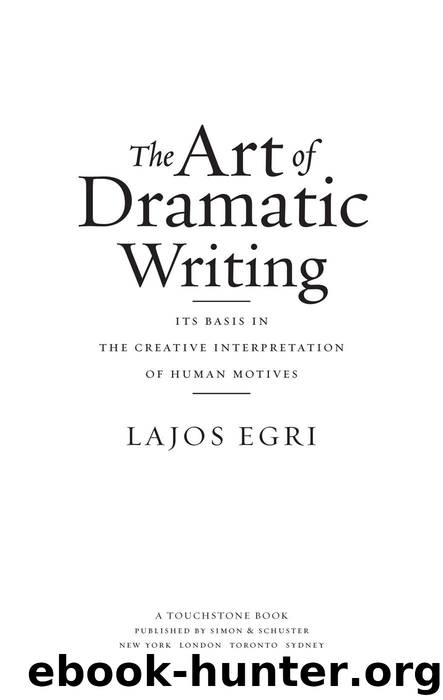The Art of Dramatic Writing: Its Basis in the Creative Interpretation of Human Motives by Egri Lajos

Author:Egri, Lajos [Egri, Lajos]
Language: eng
Format: azw3, epub
Publisher: Touchstone
Published: 1899-12-31T16:00:00+00:00
4
JUMPING
One of the chief dangers in any jumping conflict is that the author believes the conflict is rising smoothly. He resents any critic who insists that the conflict jumps. What are the danger signals which an author can look for? How can he tell when he is going in the wrong direction? Here are a few pointers:
No honest man will become a thief overnight; no thief will become honest in the same period of time. No sane woman will leave her husband on the spur of the moment, without previous motivation. No burglar contemplates a robbery and carries it out at the same time. No violent physical act was ever carried out without mental preparation. No shipwreck has ever occurred without a sound reason. Some essential part of the ship may be missing; the captain may be overworked or inexperienced or ill. Even when a ship collides with an iceberg, human negligence is involved. Read Good Hope by Heijermans, and see how a ship thus goes under and human tragedy reaches a new height.
If you want to avoid jumping or static conflicts, you might as well know beforehand what road your characters have to travel.
Here are a few examples. They might go from:
drunkenness to sobriety
sobriety to drunkenness
timidity to brazenness
brazenness to timidity
simplicity to pretentiousness
pretentiousness to simplicity
fidelity to infidelity, and so on.
If you know your character has to travel from one pole to another, you are in an advantageous position to see that he or she grows at a steady rate. You are not fumbling around; instead, your characters have a destination and they fight every inch of the way to reach it.
If your character starts from “fidelity,” and with a Gargantuan leap arrives at “infidelity,” omitting the intervening steps, it will be a jumping conflict, and your play will suffer.
Here is a jumping conflict:
HE: Do you love me?
SHE: Oh, I don’t know.
HE: Don’t be a dumbbell. Make up your mind, will you?
SHE: Smart guy, huh?
HE: Not so smart if I can fall for a dame like you.
SHE: I’ll smack your face in a minute. [She walks away.]
He in this instance started from “fondness,” and arrived at “sneering,” without any transition at all. She started from “uncertainty” and leaped to “anger.”
The man’s character was false at the start—false because if he loved her, he could not ask for her love and say in the same breath that she is a dumbbell. If he thought her dumb in the first place, he wouldn’t want her love.
Both are of the same type again—impetuous, excitable. Transition in such characters moves with lightning speed. Before you knew it, the scene was over. Yes, you can prolong it, but since they are moving with leaps and bounds, they’ll be in each other’s hair in no time. Liliom, in Ferenc Molnar’s play, is the same type as “He” in this scene. But Liliom’s counterpart is exactly the opposite. Julie is subservient, patient, and loving.
Badly orchestrated characters usually create static or jumping conflict, although even well-orchestrated characters can jump—and frequently do—if the proper transition is missing.
Download
The Art of Dramatic Writing: Its Basis in the Creative Interpretation of Human Motives by Egri Lajos.epub
This site does not store any files on its server. We only index and link to content provided by other sites. Please contact the content providers to delete copyright contents if any and email us, we'll remove relevant links or contents immediately.
Asking the Right Questions: A Guide to Critical Thinking by M. Neil Browne & Stuart M. Keeley(5761)
Autoboyography by Christina Lauren(5228)
Eat That Frog! by Brian Tracy(4526)
Dialogue by Robert McKee(4389)
Sticky Fingers by Joe Hagan(4188)
Journeys Out of the Body by Robert Monroe(3615)
Annapurna by Maurice Herzog(3464)
Full Circle by Michael Palin(3443)
Schaum's Quick Guide to Writing Great Short Stories by Margaret Lucke(3375)
Elements of Style 2017 by Richard De A'Morelli(3343)
The Art of Dramatic Writing: Its Basis in the Creative Interpretation of Human Motives by Egri Lajos(3061)
Atlas Obscura by Joshua Foer(2955)
Why I Write by George Orwell(2945)
The Fight by Norman Mailer(2930)
The Diviners by Libba Bray(2927)
In Patagonia by Bruce Chatwin(2922)
The Mental Game of Writing: How to Overcome Obstacles, Stay Creative and Productive, and Free Your Mind for Success by James Scott Bell(2902)
Venice by Jan Morris(2568)
The Elements of Style by William Strunk and E. B. White(2470)
